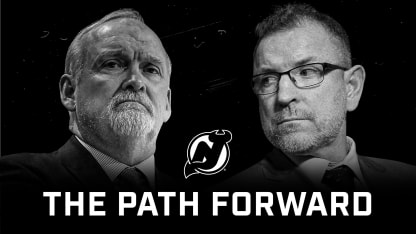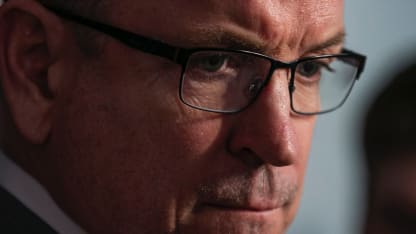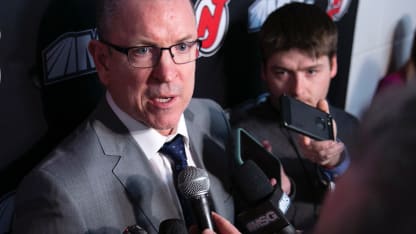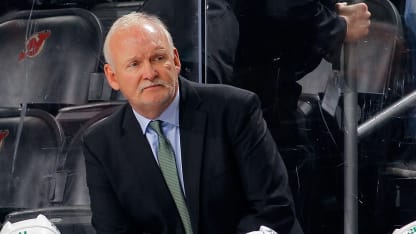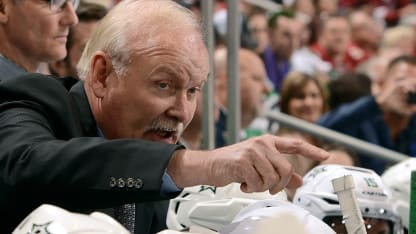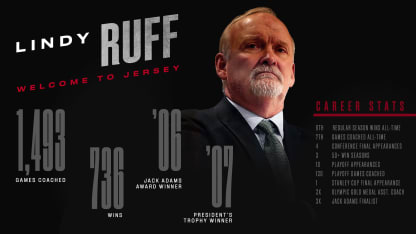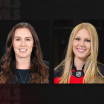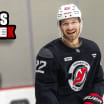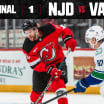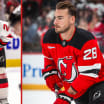"The expectation is to put a competitive team on the ice," said Reynolds. That's a hard task to accomplish without the right general manager and head coach tandem.
New Jersey placed Fitzgerald in charge of the coaching search but the general manager has insisted that this was a complete organizational hire. Everything that drove the decision on the next coach followed a specific vision for what is the correct fit for this current roster and where they want to get to.
"Right coach at the right time, for this team," was the mantra. And it has been a process to determine the right pillars the Devils need in a head coach.
"I think we were pretty fortunate to have a lot of time on our hands in the last few months here to try and make the right decision for this organization moving forward," said Brodeur.
The first step was determining where this team is today and where it will be next season and the one thereafter. Then Fitzgerald, along with the Devils brass, needed to decide what personality, coaching style and resume fit those parameters, What complements the current players the best? The coaching search involved speaking with a group of candidates, then narrowing them down to repeat interviewees with some of the conversations lasted hours.
"Within that process, I talked with X amount of people, realizing there was a core group of people who needed to be talked to again," said Fitzgerald. The general manager asked the coaches to discuss their philosophy and tactics with him, treating him as if he were their player.
"I'm the student," said Fitzgerald. "If I can understand it these guys should be able to understand it. Then the next steps were sitting down with Marty and [the managing partners]."
"Lindy Ruff was one of the guys that we looked at early on, just because of his experience," said Brodeur. The Devils first spoke with Ruff at the end of March and reconnected with him several times as he began to pull away from the pack.
"I was able to spend significant time with Lindy," said Blitzer. "He impressed Josh, myself and our entire group with his experience and success at every level during his 25-plus year coaching career, his enthusiasm, his ability to communicate extremely well, and the way he's developed players over the years. We just think he's very well suited to be the leader on the ice for this organization at this point in time."
Ruff certainly checks the experience box. There are only six coaches in the entire history of the National Hockey League who have coached more regular-season games than Ruff (1,493). That list is Scotty Bowman (2,141), Joel Quenneville (1,705), Barry Trotz (1,674), Al Arbour (1,607), Paul Maurice (1,600), and Ken Hitchcock (1,598).
In addition to the regular-season experience, Ruff has coached in the 15th most playoff games in NHL history, just one behind current Islanders Head Coach Barry Trotz. Including Trotz, only three active head coaches in the league have been behind the bench for more postseason games than Ruff.
"We are proud and excited to have Lindy Ruff join our organization as Head Coach. He is one of the most successful and respected coaches in the NHL, not only today but in League history," said Fitzgerald.
"It's an exciting time for us to have a guy like that. It reminds me a lot of the Jacques Lemaireera," said Brodeur. "A guy that has been there and done that before. And I think it's going to be good for you for your organization and for a franchise."
But in addition to longevity and experience, the Devils felt the prime candidate must possess a certain "personality" that would help drive a younger roster to success.
"We have such a young team," said Brodeur. "We wanted to get a father figure a little bit, a guy that knows the league, and who has been around the league a lot to really help our young players move toward the right direction and trying to get us into the playoffs and having some success in the near future. And Lindy kind of checked a lot of those boxes for us."
As the Devils move forward with a roster that will be led by younger talent, like Nico Hischier, Mackenzie Blackwood, Jack Hughes, Jesper Bratt, and with a plethora of young prospects knocking at the door of the NHL, it was important to the Devils organization to provide this core group with that "father figure" Brodeur mentioned. His resume commands respect, but his personality and ability to connect with these athletes keeps it.
"It doesn't matter whether you're a veteran, whether you're one of our young guys or one of our developmental guys coming up through the system, he's a coach that is going to hold people accountable," said Reynolds. "He's going to invest in the players and help them get to that next level."
"Whenever you start talking to him, it's funny," said Brodeur, "you just want to keep, keep going and talk to him. He's got a really infectious personality. I think his demeanor is really laid back. I think he shows a lot of confidence in himself with the way he walks around and the way he talks. And I think our players will benefit from a guy like that's been around and knows what he's talking about. And one of the other things too is he's welcoming a lot of help around him. So I'm sure we'll build a really good staff around him to help everybody."
Ruff does have a track record of cultivating young talent. Adam Fox, Ryan Lindgren, Tony DeAngelo, Tyler Seguin, John Klingberg, Jamie Benn, Tim Connolly, Tyler Ennis, Tyler Myers, Ryan Miller, Michael Peca, Jason Pominville, Thomas Vanek, and many others are on the list of having success at a young age under Ruff's guidance.
In his most recent stop as a head coach in Dallas, the Devils were impressed with his work with a few of those names in particular. Seguin was consistently a .67 point-per-game player, but under Ruff, he exploded to post 1.05, 1.08, 1.01, and .87. Benn cracked the 30-goal plateau under Ruff three times and won an Art Ross trophy.
"Sometimes a young guy wants to get to the finish line a little faster than possible," said Ruff. "I think that all the things as a coach you're trying to instill in a player, whether it's work ethic off the ice, your practice habits, even your eating, and sleeping habits to get you to be able to perform at an optimal level… there are a lot of things that get you to be a good pro, good NHL pro. A young player steps in who maybe aren't as developed physically as the players who are there, now you're playing against grown men that are twice your size, twice as strong, you have to get them to a point where they're comfortable."

